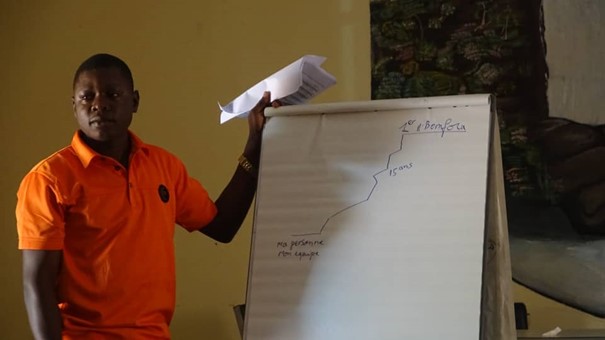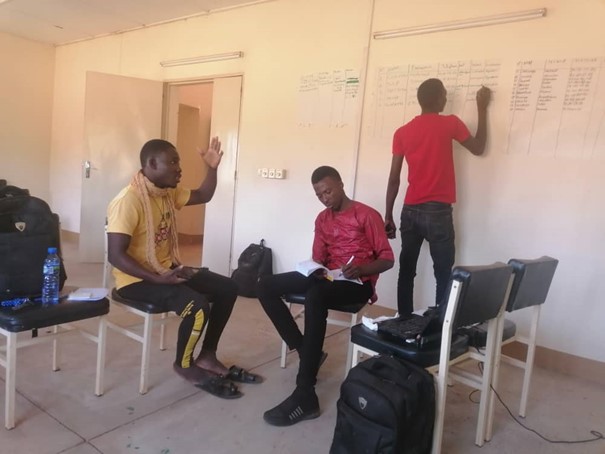IRC Burkina aims to strengthen the knowledge of young entrepreneurs who can have a direct impact on improving WASH services
Published on: 27/01/2022
Since 2019, IRC has been implementing a strategy to support young entrepreneurs in the WASH sector in Banfora, through a technical support/advisory approach based on incubation. For three consecutive years, the programmeme has been building the capacity of young people, through technical support on the development and implementation of innovative projects in the WASH sector. Supported by the Banfora town hall and accompanied by other partners including Catholic Relief Services (CRS) and Espace Culturel Gambidi (ECG).

KINDA Hervé Nontomdé, young WASH project leader and beneficiary of the incubator programmeme initiated by IRC, presents his project and vision during a coaching session (Ph. A. Traoré)
The incubator programme for drinking water, hygiene and sanitation projects in Banfora aims above all to support the municipality of Banfora in the implementation of its communal strategic plan for public drinking water and sanitation services by 2030 by involving private sector actors. IRC's support aims to strengthen the knowledge of young actors who can have a direct and significant impact on improving WASH services. This capacity building should lead to the transformation of project ideas into start-up businesses and project holders into young entrepreneurs. According to Juste Nansi, Country Director of IRC Burkina, “it is appropriate to focus during the sessions on the mobilisation of local resources and the sustainability of businesses through profitability. The idea behind this type of initiative is to turn these young entrepreneurs into leaders on whom to rely for carrying out actions in the sector.”
Five projects were selected out of the 30 received in the first phase of the programme, which ended in 2020, and they were admitted into the SiraLabs incubator. This first phase of the programme allowed participants to mature their project ideas, to validate the viability and profitability of their entrepreneurial projects and ended with the drafting of business plans. The second phase of the process, which started at the beginning of 2021, was mainly aimed at ensuring the adequacy of the prototype of the projects and the needs of the market; reinforcing the managerial capacities of the future entrepreneurs and support them in the formalising their projects.
For example, Bamba Aboubakar Idrisse is the initiator of a project to provide mobile toilets in public places in Banfora. “It all started with an observation. As part of our collaboration with young traders, we created the association of young traders of Banfora. One evening, during a team meeting at the big market in Banfora, I noticed that all those who wanted to relieve themselves had nowhere to go because there were no latrines nearby. So I decided to find a solution for this problem while generating income. Thanks to IRC’s programme, I received support from the SiraLabs incubator. Today, thanks to the training, coaching and mentoring, and technical support I received, I was able to better understand the ins and outs of implementing a project and I am now able to go out and seek funding to make my business a reality.”

From left to right, OUEDRAOGO Frank Alain and BAMBA Aboubakar Idrisse, both project leaders (Ph, A. Traoré)
According to Issiaka Boreaud, who is in charge of implementing the programme at SiraLabs, throughout the process, the project promoters benefited from personalised follow-up to receive answers to the problems of creating or managing and developing a business. "During regular meetings, I listened to the young future entrepreneurs to guide them, support them in their efforts, give them the benefit of my experience and make my contacts available to them," he said enthusiastically.
The approach was very participatory with active involvement of the learners and sufficiently practical, supported by the sharing of experiences of all stakeholders and the creation of business management tools. Individual coaching sessions were part of the training provided. It was also an opportunity to learn how to improve productivity and optimise returns in a business. Thanks to the programme, the steps concerning the legal form of the enterprises were initiated, allowing two of the participants to officially formalise their start-ups at the Centre de Formalités des Entreprises (CEFORE) in Banfora and obtain the related fiscal and authentication documents. This is an essential step in the creation of a company in the Burkinabe context and is a good start for the rest of the process and should be followed by the search for funding for the realisation of projects. In this context, the entrepreneurs had the opportunity to meet with the heads of the national funds in Banfora, notably the Fonds d'Appui aux Initiatives des Jeunes (FAIJ) and the Fonds d'Appui à la Promotion de l'Emploi (FAPE) on December 27, 2021. The session continued with a presentation of the financing opportunities available in the entrepreneurial system in Burkina Faso and a theoretical and practical phase on the project pitch.
“The next step is to follow these projects closely to see how the companies will be set up and how they will perform in the market. IRC plans to provide technical support in collaboration with its partner SiraLabs, to follow them and strengthen their capacities to manage their companies.”, said Benjamine Paré, Senior WASH Governance Expert at IRC.
Furthermore, IRC intends to explore with ONEA and Vergnet, who are now in charge of managing drinking water in rural areas in Banfora, the possibilities of involving young entrepreneurs in the provision of drinking water services. To this end, a brainstorming workshop may be organised by the end of 2022 in collaboration with SiraLabs, Vergnet, ONEA, the Banfora town hall, and CRS to closely examine opportunities for a new round of WASH project incubation by 2025.